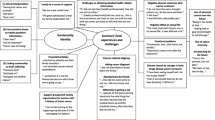Abstract
In 2015, 231,840 American women were diagnosed with invasive breast cancer. This figure represents mothers, wives, or sisters diagnosed with cancer, a diagnosis which has the potential to affect those closest to them, especially their immediate family. This research aimed to examine the lived experience of a family unit that lost their spouse/mother/sister-in-law to invasive breast cancer. A phenomenological case study was utilized to guide this research. One family unit, consisting of a spouse, daughter, son, and sister-in-law to the deceased were recruited from Southern Ontario, Canada. Background questionnaires and one-on-one semi-structured interviews were conducted. The following themes emerged: (1) negatives, describing struggles with balancing care, faith, and living after a death in the family and (2) silver linings, depicting the strength that Nancy, the deceased, maintained during her illness, and the family’s hope and optimism for the future. This paper only addresses the theme “Negatives,” while the last theme is addressed in Part II of this research. Within the theme “Negatives,” there were four sub-themes: (1) What About the Kids? (2) The Balancing Act, (3) Why Would He Do This? and (4) Life After Mom. Each will be discussed in turn. This research study provides valuable information regarding the lived experiences of families coping with a parental/spousal cancer diagnosis. It may assist other individuals in similar situations by providing comfort knowing that they are not the only ones encountering this journey. The participants’ voices may also allow others to develop strength by understanding the effect of cancer on a family.
Similar content being viewed by others
References
American Cancer Society. (2015). Cancer facts and figures 2015. Retrieved September 10, 2015 from http://www.cancer.org/acs/groups/content/@editorial/documents/document/acspc-044552.pdf.
Barnes, J., et al. (2000). Qualitative interview study of communication between parents and children about maternal breast cancer. BMJ, 321, 19–26.
Canadian Cancer Society. (2015). Cancer Statistics at a glance. Retrieved July 20, 2015 from http://www.cancer.ca/en/cancer-information/cancer-101/cancer-statistics-at-a-glance/?region=on.
Chalmers, K., et al. (2000). Perceptions of the role of the school of providing information and support to adolescent children of women with breast cancer. Journal of Advanced Nursing, 31, 1430–1438.
Chekryn, J. (1984). Cancer recurrence: Personal meaning, communication, and marital adjustment. Cancer Nursing, 7, 491–498.
Christ, G. H., et al. (1993). Impact of parental terminal cancer on latency-age children. The American Journal of Orthopsychiatry, 63, 417–425.
Compas, B. E., et al. (1994). When mom or dad has cancer: Markers of psychological distress in cancer patients, spouses, and children. Health Psychology, 13(6), 507–515.
Compas, B. E., Worsham, N. L., Ey, S., & Howell, D. C. (1996). When Mom or Dad has cancer: II. Coping, cognitive appraisals, and psychological distress in children of cancer patients. Health Psychology, 15, 167–175.
Creswell, J. W. (2013). Qualitative inquiry & research design: Choosing among the five approaches. Los Angeles: Sage.
Ekwall, A., & Hallberg, I. R. (2007). The association between caregiving satisfaction difficulties and coping among older family caregivers. Journal of Clinical Nusing, 16(5), 832–844.
Forrest, G., et al. (2006). Breast cancer in the family—Children’s perceptions of their mother’s cancer and its initial treatment: Qualitative study. BMJ, 332, 998–1003.
Gates, M. F., & Lackey, N. R. (1998). Youngsters caring for adults with cancer. Image Journal of Nursing Scholarship, 30, 11–15.
Harris, C. A., & Zakowski, S. G. (2003). Comparisons of distress in adolescents of cancer patients and controls. Psycho-Oncology, 12, 173–182.
Hasson-Ohayon, I., et al. (2010). Women with advanced breast cancer and their spouses: Diversity of support and psychological distress. Psycho-Oncology, 19, 1195–1204.
Heiney, S. P., et al. (1997). Impact of parental anxiety on child emotional adjustment when a parent has cancer. Oncology Nursing Forum, 24, 655–661.
Helseth, S., & Ulfsaet, N. (2005). Parenting experiences during cancer. Journal of Advanced Nursing, 52(1), 38–46.
Hoke, L. A. (2001). Psychosocial adjustment in children of mothers with breast cancer. Psycho-Oncology, 10, 361–369.
Kennedy, V. L., & Lloyd-Williams, M. (2009). How children cope when a parent has advanced cancer. Psycho-Oncology, 18(8), 886–892.
Lewis, F. M. (1990). Strengthening family supports: Cancer and the family. Cancer, 65, 158–165.
Lewis, F. M., Hammond, M. A., & Woods, N. F. (1993). The family’s functioning with newly diagnosed breast cancer in the mother: The development of an exploratory model. Journal of Behavioral Medicine, 16, 351–370.
Lincoln, Y. S., Guba, E. G. (1985). Naturalistic inquiry. London: Sage.
Nelson, E., Sloper, E., Charlton, A., & White, D. (1994). Children who have a parent with cancer: A pilot study. Journal of Cancer Education, 9, 30–36.
Patterson, P., & Rangganadhan, A. (2010). Losing a parent to cancer: A preliminary investigation into the needs of adolescents and young adults. Pallative and Supportive Care, 8, 255–265.
Patton, M. Q. (2002). Qualitative research and evaluation methods. Thousand Oaks: Sage.
Rosenfeld, A., et al. (1983). Adaptation of children of parents suffering from cancer: A preliminary study of a new field for primary prevention research. The Journal of Primary Prevention, 3, 244–250.
Spira, M., & Kenemore, E. (2000). Adolescent daughters of mothers with breast cancer: Impact and implications. Clinical Social Work Journal, 28, 183–195.
Thomas, C., Morris, S. M., & Harman, J. C. (2002). Companions through cancer: The care given by informal carers in cancer contexts. Social Science and Medicine, 54(4), 529–544.
Van Manen, M. (1990). Researching lived experience: Human science for an action sensitive pedagogy. London: The Althouse Press.
Welch, A. S., Wadsworth, M. E., & Compas, B. E. (1996). Adjustment of children and adolescents to parental cancer: Parents and children’s perspectives. Cancer, 77, 1409–1418.
Funding
This research received no specific grant from any funding agency in the public, commercial, or not-for-profit sectors.
Author information
Authors and Affiliations
Corresponding author
Ethics declarations
Conflict of interest
The author(s) declare(s) that there is no conflict of interest.
Rights and permissions
About this article
Cite this article
Molinaro, M.L., Fletcher, P.C. & Bryden, P.J. “This is. That was.” Examining a Family’s Lived Experiences After a Cancer Diagnosis. J Adult Dev 24, 287–294 (2017). https://doi.org/10.1007/s10804-017-9266-9
Published:
Issue Date:
DOI: https://doi.org/10.1007/s10804-017-9266-9



